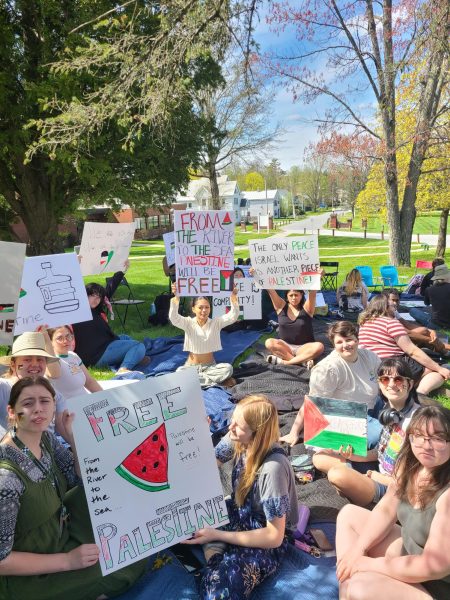Still in the dark
With the news that Dr. Parwinder Grewal had resigned from his position as president of Vermont State University came the news that the plans for the libraries and athletic programs had been put on hold, and later that they had been revoked. While this seems, on the surface, to be good news and to prove that the administration has, in fact, been listening to students’ concerns, this may not be entirely true. While it is good that we are being allowed to keep our libraries – and to keep them functioning as libraries – and are getting more time to prove that our athletic programs deserve to remain in their current conferences, it is hard to tell why, exactly, the decision to change these plans was made. Was it because the students were upset or because it was giving the university bad press?
Grewal resigned for “personal reasons,” according to an email, a press release, and a number of local news articles, which does not make it immediately obvious why, exactly, certain transformation plans were put on hold and/or changed. It is the feeling of many throughout the VTSU community, however, that Grewal was a kind of “sacrificial lamb.” That is, it seems that Grewal was appointed to the position of the inaugural president of VTSU so that he could make the difficult announcements based off of plans that had been in the works long before he became a part of the university. As a result, it created the appearance that Grewal was at the center of decisions such as those surrounding the libraries and athletic programs, when he likely played a very small part in making them. While the administration has stated that they cannot speak to what Grewal’s reasons for resigning were – beyond that they were “personal reasons” – they have also not denied that they may be related to the controversies surrounding those decisions.
Grewal has been replaced by Mike Smith, former Secretary of Human Services for the state of Vermont, who will serve as interim president of Vermont State University for six months while the search for a new president takes place. Smith, however, has very little experience working in higher education, which is concerning to many, especially considering that he is coming in at a very sensitive time for the university – the official beginning of VTSU. While there are those who feel glad to see Grewal go – due in large part to their perception that he was the one making the big decisions – there are also those who do not understand how a person with close to no experience in higher education institutions is supposed to lead one.
This is not to say that Smith has no experience leading any institution. In fact, he is so well-known for his experience in interim positions – particularly for institutions in danger of failing – that he has earned himself the title “Interim-fixer in Chief.” The problem is that the last time this “fixer in chief” led an academic institution as interim president it was Burlington College, which ultimately folded only a couple of years after Smith left. So if Smith’s most pertinent experience in a higher education institution is with one on the brink of closure, how can we expect him to lead us into our new university just as it begins?
While Grewal was not a perfect president, it is important to acknowledge that he did the best he could under the circumstances – which included requirements to cut $25 million over only 5 years – and that many of the controversial decisions made during his tenure were in the works long before his appointment. All presidents rely on information given to them by others, and this fact will not change with a new president for the university. Even Smith will have the same advisors as Grewal and will be making his own recommendations based on those made to him by the same senior leadership team. This will be true also for the next appointment to the position.
In many ways, it may not be an issue of who the president is – though one would hope the president beyond the interim will have more experience working in higher education – but what the president actually has the power to do. It seems that Grewal came in with many decisions having already been made with the board of trustees needing only someone willing to throw themselves to the masses and announce them, yet it is Grewal who has been taking much of the heat in response to those decisions. We may very well see the same thing with Smith, and again with whoever comes next.
The president of a university is, the public face of that university. This makes it seem as though the president has the most power and is making the most decisions, but this is not necessarily true. Of course, in a system with only two presidents (that of the VTSU as a whole, overseeing the Johnson, Lyndon, Randolph, Castleton, and Williston campuses and that of CCV), one wonders what the purpose of the Chancellor’s office is. Why, exactly, do we require a chancellor when the two presidents within this newly consolodated system have an opportunity to work more closely with each other? Why, amidst legislation requiring that the VTSU save $5 million a year, did the chancellor’s office receive an additional $1 million in the past year? Why, after all of the controversies in the last semester alone, does it still feel as though most of the VTSU community is being left in the dark about important information and decisions?
Deanna Oakes




